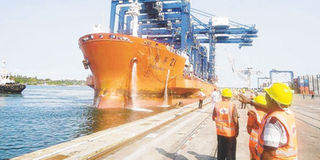Plea for next government to invest amply in transport sector

China’s Zen Hua 21, carrying two ship to shore gantry and seven rubber-tyred gantry cranes for the Tanzania International Container Terminal berths at the Port of Dar es Salaam in September last year. A sustained investment to spur the performance of the country’s major port is all the business community needs – irrespective of who wins in the October General Election. PHOTO|FILE
What you need to know:
The Tanzania International Container Terminal Services urges the next government to invest heavily in infrastructure for the port to be competitive
Dar es Salaam. For the first time in the history of multiparty politics in Tanzania, the opposition political parties have decided to field one candidate at all levels in this year’s General Election.
In a country where for a long time the ruling party has had a smooth ride, this year’s elections give pundits, including investors, a difficult moment of predicting the shape of the coming government – which will ultimately impact on social, economic and political policies.
However, investors in the transport sector are still hopeful that whatever happens, Tanzania’s peaceful nature will see them keep injecting their money in the economy for the general good of the country’s economic development endeavours.
Though conceding that the peacefulness of the elections is key to their decisions, decision makers in some key companies believe they will keep injecting their money in the country’s economy.
“We will not reduce our activities due to the election. On the contrary we are on a drive to improve port performance to the levels never witnessed before…We are keen to invest further in Tanzania and ready to talk with the government to extend our agreement,” the chief executive officer for the Tanzania International Container Terminal Services Ltd (Ticts) Mr Paul Wallace, told BusinessWeek.
The company has invested around Sh50 billion during the last few years and has plans to invest a further Sh80 billion in the next 12 months. The money will go towards purchasing of new cranes and equipment which will enable Ticts to handle the larger vessels that will dock at Tanzania’s major seaport upon completion of the ongoing berth dredging exercise.
“With such plans, there is no way we can talk of reducing our activities due to the election,” said Mr Wallace.
However, Ticts urges the next government to continue investing heavily in infrastructure for the port to be competitive.
“My belief is that the Ministry of Transport is very active and had done a great deal to improve communication and efficiency at our ports. As a result, priority issues continue to be addressed. Similar investments shall be made to other infrastructure including rail network, roads and ports,” he said.
In April this year, the government announced that the Port of Dar es Salaam will undergo a massive upgrade during the next few years so as to put it abreast with the increasing traffic passing through the country’s major gateway.
The World Bank (WB), the UK’s Department for International Development and TradeMark East Africa (TMEA) will inject a total of $596 million (about Sh1.25 trillion on the prevailing exchange rate) in the project that seeks to upgrade the Port of Dar es Salaam during the next few years.
The money will go towards the deepening and strengthening of berths 1-7, the dredging of the entrance channel and turning basin in the port.
This is the investment that Ticts believes needs to be sustained by whoever forms the next government.
Because the port is of key national importance and also serves as a window to global trade for the neighbouring land-locked countries, Ticts believes that as larger vessels come the country need to construct deep-water capacity with longer berth lengths and then buy bigger new cranes which can effectively service this larger tonnage.
“We are seeing a lot of consolidation of services within container shipping lines who wants to achieve economies of scale, they are now operating larger tonnage and several partners then sharing vessels so building lots of new, smaller terminals all at the same time does not add value,” said Mr Wallace.
He also urges the coming government to continue with plans of constructing the Bagamoyo port due to its importance on the country’s economic development.
According to Ticts, Bagamoyo lends itself well towards industrial development.
“Should that region be port-connected then that is another benefit as we need to migrate truck volumes to other modes such as coastal feeder and rail to reduce road congestion, support the environment and improve safety – we need to reduce the number of traffic accidents.”
Aviation
Similar sentiments were echoed by investors in the aviation sector who believe they would continue to irrespective of who carries the day during the October tripartite lections.
A director with one of the airlines who preferred anonymity told BusinessWeek the sector investors’ only hope is that the general election should usher in a leader who will have interest in aviation.
“The outgoing top government officials had little interest in aviation and that is why Air Tanzania Limited went from bad to worse, with not even a single plane being bought in the past ten years,” he said.
He expects that the next government will subsidise aviation by removing taxes and take over the burden of financing the operations of the Civil Aviation Authority from operators.
“Air operators pay very many taxes which translate into higher fares….I hope that the next government will never create new taxes or have intentions to increase the existing ones. Aviation or air transport will require government support for a long time before it can stand on its own,” he said
In doing so, the next government must borrow a leaf from what countries like the United Arab Emirates, the Emirate of Dubai, Qatar Saudi Arabia are doing with regard to supporting Etihad, Emirates, Qatar Airlines and Saudia airlines respectively.
“So in short, we expect policy stability as well as peace and tranquility from whoever wins the presidency,” he said.
The growth of the aviation sector, according to experts is championed by active top government officials and the army.
The army is supposed to be the key trainer of pilots and engineers.
“Even if we buy planes now, we won’t get enough pilots and maintenance engineers since the army is no longer playing its role of training experts. Many pilots in the world have their backgrounds in the army,” he said.
Freight forwarders
Tanzania’s freight forwarders wish that the next government will continue to work on eliminating challenges they have been facing if the sector is to make a meaningful contribution to the country’s economic development endeavours.
The Taffa president Stephen Ngatunga told BusinessWeek that the next government must work on challenges including bureaucracy from shipping agents, exorbitant fees charged by ship owners and their agents, high container booking charges, costs and bureaucracy connected to the renewal of freight forwarding licences, countless identity cards for clearing agents to enter the port premises and an immediate revival of the Port Improvement Committee (PIC).
Freight forwarders are key in tax collection and according to Tanzania Freight Forwarders Association president Stephen Ngatunga they collect more than 51 per cent of the total revenue collected by TRA.
“We are not afraid of the next government. We are ready to work with any government that will come into power.”




